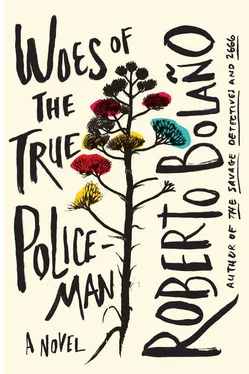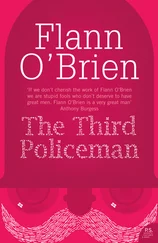Roberto Bolaño
Woes of the True Policeman
To the memory of Manuel Puig and Philip K. Dick
I. THE FALL of the BERLIN WALL
According to Padilla, remembered Amalfitano, all literature could be classified as heterosexual, homosexual, or bisexual. Novels, in general, were heterosexual. Poetry, on the other hand, was completely homosexual. Within the vast ocean of poetry he identified various currents: faggots, queers, sissies, freaks, butches, fairies, nymphs, and philenes. But the two major currents were faggots and queers. Walt Whitman, for example, was a faggot poet. Pablo Neruda, a queer. William Blake was definitely a faggot. Octavio Paz was a queer. Borges was a philene, or in other words he might be a faggot one minute and simply asexual the next. Rubén Darío was a freak, in fact, the queen freak, the prototypical freak (in Spanish, of course; in the wider world the reigning freak is still Verlaine the Generous). Freaks, according to Padilla, were closer to madhouse flamboyance and naked hallucination, while faggots and queers wandered in stagger-step from ethics to aesthetics and back again. Cernuda, dear Cernuda, was a nymph, and at moments of great bitterness a faggot, whereas Guillén, Aleixandre, and Alberti could be considered a sissy, a butch, and a queer, respectively. As a general rule, poets like Blas de Otero were butches, while poets like Gil de Biedma were — except for Gil de Biedma himself — part nymph and part queer. Recent Spanish poetry, with the tentative exception of the aforementioned Gil de Biedma and probably Carlos Edmundo de Ory, had been lacking in faggot poets until the arrival of the Great Faggot of All Sorrows, Padilla’s favorite poet, Leopoldo María Panero. And yet Panero, it had to be admitted, had fits of bipolar freakishness that made him unstable, inconsistent, and hard to classify. Of Panero’s peers, a curious case was Gimferrer, who was queer by nature but had the imagination of a faggot and the tastes of a nymph. Anyway, the poetry scene was essentially an (underground) battle, the result of the struggle between faggot poets and queer poets to seize control of the word . Sissies, according to Padilla, were faggot poets by birth who, out of weakness or for comfort’s sake, lived within and accepted — most of the time — the aesthetic and personal parameters of the queers. In Spain, France, and Italy, queer poets have always been legion, he said, although a superficial reader might never guess. What happens is that a faggot poet like Leopardi, for example, somehow reconstrues queers like Ungaretti, Montale, and Quasimodo, the trio of death. In the same way, Pasolini redraws contemporary Italian queerdom. Take the case of poor Sanguinetti (I won’t pick on Pavese, who was a sad freak, the only one of his kind). Not to mention France, great country of devouring mouths, where one hundred faggot poets, from Villon to Sophie Podolski, have nurtured, still nurture, and will nurture with the blood of their tits ten thousand queer poets with their entourage of philenes, nymphs, butches, and sissies, lofty editors of literary magazines, great translators, petty bureaucrats, and grand diplomats of the Kingdom of Letters (see, if you must, the shameful and malicious reflections of the Tel Quel poets). And the less said the better about the faggotry of the Russian Revolution, which, if we’re to be honest, gave us just one faggot poet, a single one. Who? you may ask. Mayakovsky? No. Esenin? No. Pasternak? Blok? Mandelstam? Akhmatova? Hardly. There was just one, and I won’t keep you in suspense. He was the real thing, a steppes-and-snow faggot, a faggot through and through: Khlebnikov. And in Latin America, how many true faggots do we find? Vallejo and Martín Adán. Period. New paragraph. Macedonio Fernández, maybe? The rest are queers like Huidobro, fairies like Alfonso Cortés (although some of his poems are authentically fagotty), butches like León de Greiff, butch nymphs like Pablo de Rokha (with bursts of freakishness that would’ve driven Lacan himself crazy), sissies like Lezama Lima, a misguided reader of Góngora, and along with Lezama all the queers and sissies of the Cuban Revolution except for Rogelio Nogueras, who is a nymph with the spirit of a faggot, not to mention, if only in passing, the poets of the Sandinista Revolution: fairies like Coronel Urtecho or queers who wish they were philenes, like Ernesto Cardenal. The Mexican Contemporaries are also queers (no, shouted Amalfitano, not Gilberto Owen!); in fact Death Without End is, along with the poetry of Paz, the “Marseillaise” of the highly nervous Mexican poets. More names: Gelman, nymph; Benedetti, queer; Nicanor Parra, fairy with a hint of faggot; Westphalen, freak; Pellicer, fairy; Enrique Lihn, sissy; Girondo, fairy. And back to Spain, back to the beginning: Góngora and Quevedo, queers; San Juan de la Cruz and Fray Luis de León, faggots. End of story. And now, to satisfy your curiosity, some differences between queers and faggots. Even in their sleep, the former beg for a twelve-inch cock to plow and fertilize them, but at the moment of truth, mountains must be moved to get them into bed with the pretty boys they love. Faggots, on the other hand, seem to live as if a dick were permanently churning their insides, and when they look at themselves in the mirror (something they love and hate with all their heart), they see the Pimp of Death in their own sunken eyes. For faggots and fairies, pimp is the one word that can cross unscathed through the realms of nothingness. But then, too, nothing prevents queers and faggots from being good friends, from neatly ripping one another off, criticizing or praising one another, publishing or burying one another in the frantic and moribund world of letters.
“You missed the category of talking apes,” said Amalfitano when Padilla at last fell silent.
“Ah, those talking apes,” said Padilla, “the faggot apes of Madagascar who refuse to talk so they don’t have to work.”
When Padilla was five his mother died, and when he was twelve his older brother died. When he was thirteen he decided that he would be an artist. First he thought he liked theater and film. Then he read Rimbaud and Leopoldo María Panero and he wanted to be a poet as well as an actor. By the time he was sixteen he’d devoured literally all the poetry that fell into his hands and he’d had two (rather unfortunate) experiences at the local community theater, but that wasn’t enough. He learned English and French, took a trip to San Sebastián, to the Mondragón insane asylum, and tried to visit Leopoldo María Panero, but once the doctors had seen him and listened to him talk for five minutes, they turned him away.
At seventeen he was a tough, well-read, sarcastic kid, prone to bursts of anger that could lead to violence. Twice he resorted to physical aggression. The first time, he was walking through Parque de la Ciudadela with a friend, another poet, when two young skinheads insulted them. They might have called them faggots, something like that. Padilla, who was usually the one to taunt others, stopped, went up to the bigger kid, and punched him in the neck, making him gasp and choke; while the kid was trying to keep his balance and get his breath, he was felled by a swift kick to the groin; his friend tried to help but what he saw in Padilla’s eyes was more powerful than the bonds of friendship and he chose to flee the scene. It was all over very quickly. Before Padilla moved on, he had time to aim a few kicks at the bald head of his fallen opponent. Padilla’s young poet friend was horrified. Days later, when he took Padilla to task for his behavior (especially his final outburst, the gratuitous kicking of his enemy when he was down), Padilla answered that when fighting Nazis, everything was permitted. On Padilla’s adolescent lips, the word everything sounded luscious. But how do you know they were Nazis? asked his friend. They had shaved heads, said Padilla tenderly, what kind of world do you live in? Also, he added, it’s your fault, because that afternoon, remember, we were talking about love, Love with a capital L , and the entire time you just kept arguing with me, calling my ideas naïve, telling me to get my head out of the clouds; every word you said, sabotaging my dreams, was like a punch in the gut. Then the skinheads turned up, and added to all my pain and suffering, of which you were well aware, was the pain of ignorance.
Читать дальше








![О Генри - Бляха полицейского О’Руна [The Badge of Policeman O'Roon]](/books/405347/o-genri-blyaha-policejskogo-o-runa-the-badge-of-po-thumb.webp)



